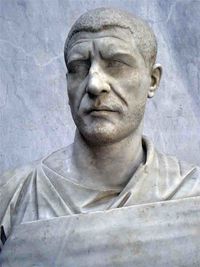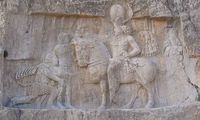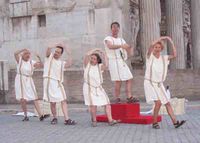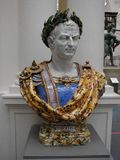Philip the Arab
“Help me blow up 1,000 balloons.”
– Philip the Arab
“I am sorry sir. I can't let you back into the Roman Empire. Your name has been flagged up as an oriental assassin on our database.”
– Officious Pompous Jobber on Philip the Arab
Philip the Arab (Latin: Philippus Arabica Cafeineus; Arabic: فيليب العربى Feyleyb al-Arab c. 204 – 249), also known as Philip or Philippus Arabs, was a one-term ruler of the Roman Empire who was never able to shake of his status as a foreign spy and fundamentally ineligible for his high status. Philip always said he was a 'true son of Rome' but that he was forever known as 'the Arab' suggests he was unsuccessful.
Origins[edit | edit source]
Enemies of Philip would later claim that his real name was Abdullah Al Kebbabi and that he had belonged to Anti-Roman subversive sect known as the 'Christians'. Others that Philip had worked as an illegal immigrant and had only become emperor when Gordian Ramases was murdered in his kitchen. Philip simply said these were all lies and blamed old fashioned Roman bigots. An inscription survives from this era makes Philip's views plain:
I hear from my enemies that I want to 'abolish' the Roman Empire and replace it with a peasant's paradise. Nothing can be further from the truth. I want the Roman world open to all, regardless of what they worshipped or what they wore when washing the family chariot on a sunday. I hide my Arabian background from no one but I am truer Roman than any of you can suspect.
Peace With Persia and Religious Policies[edit | edit source]
Philip's first act when he became emperor was to sign a peace treaty with the Persians. To help the Persians put pen to papyrus, Philip gave away Armenia and Assyria and in return receive a scented letter saying 'thanks Phil'.
Crusty Roman Senators denounced this as a betrayal and tried to convince the populace that Philip was showing his 'true Middle Eastern colours' (unspecified what that meant). The Persian empire had since 228 been under the rule of a new dynasty, the Sassanids. Shah Shapur had big ambitions to annex Rome's eastern frontier provinces and recreate the Persian empire as it had been before Alexander the Great had destroyed 500 years previously.
It was around this time there was also something of a banking problem (again) in the Roman Empire. Philip promised he had a wizard way of fixing the problem but then chose to talk about something new, a new religion he had become acquainted with whilst living in Palestine. He called it 'Loving your Fellow Man' and 'Turning the Other Cheekism'. Conservative Romans immediately called this Judeo-Christian-Pacifism and antithetical to the way of of governance as laid down by Julius Caesar and Augustus. Philip said it was inspired by the career of Jesus Christ but he was denounced and so watered down his supposed allegiance to a new ideology by reminding everyone of a glorious past. Rome was going to have a big party and everyone could come.
Party! Party!! Party!!![edit | edit source]
When or who told Philip that Rome could celebrate their millennium in 248 isn't recorded but the emperor decided to spend lavishly. According to the Romans, their city had been founded in 753 BC by Romulus, the wolf tit sucking prince who had been abandoned by his father. Romulus had planned to have his city named after himself and his brother Remus but the latter had made fun of his brother's efforts and had walked off to write stories about rabbits. Naturally Philip saw himself as a 'New Romulus' for the event which saw hundreds of gladiators, slaves and wild beasts slaughtered so that the Tiber turned crimson for an entire month.
The event served to boost Philip's popularity but he hadn't put any more money aside to treat the hangover. Food prices were increased and Philip's statues were damaged. He tried to keep the pageant going by having his son Philip the Not-As-Much-As-Arab-As-His-Father become co-emperor. But news on the Roman Empire's borders in the Balkans dampened the spirits. This would mean a new military campaign but Philip appeared to be lacking any real fight. So he stayed in Rome and dispatched the legions northwards.
Death[edit | edit source]
The Romans gathered a large force and made their way to the Danube frontier. Along the way, there was a growing mutiny amongst Philip's generals. When news that Germanic tribes had crossed over and were refusing to return home after some hearty looting, their mood grew darker. This was seen as Jupiter abandoning his people and that Philip's recent flirtation with Christians was the cause of this.
In particular one Roman general Decius came to the fore. A gentleman-general of the old school, Decius surprised one particular barbarian army as it was enjoying a long drinking bout. Though it was a battle won by trickery, for many Romans it looked like a great victory. Decius in turn thanked his troops but then blamed Rome (and therefore Philip) for under arming his soldiers. Flattered and tipsy, the legions proclaimed Decius emperor and reversed gear towards the capital city.
Philip was slow to react and tried to parley with Decius as he approached Italy. This patronising approach was a wrong move and Philip and his son were abandoned by their troops. Only a few guards were left and they slaughtered the imperial father and son shortly after as a 'Golden Hello' for Decius. In Rome the news was greeted as a new chance to party (the 1001 Rave). All of Philips old friends were dispatched, leaving just the Christians who showed respect for the dead emperor and his family. This act wasn't forgotten by Decius when he arrived in Rome a few days later. A new bout of minority persecution was about to start.
Retrospective Christian[edit | edit source]
Long after his death, Christian writers made Philip one of their own. He had apparently been the first Christian to become a Roman Emperor and that his constant denials had just been a smokescreen. This story persisted until Emperor Constantine the Great would later gain this distinction. Philip got bumped off the plaudits list and overtime, his reign was considered a disaster. What Rome really needed was to spend more money on war.





